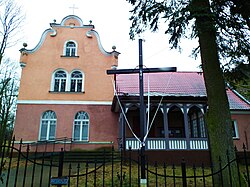Podróżna [pɔˈdruʐna] is a village in the administrative district of Gmina Krajenka, within Złotów County, Greater Poland Voivodeship, in north-central Poland.[1] It lies approximately 8 kilometres (5 mi) south-east of Krajenka, 13 km (8 mi) south of Złotów, and 95 km (59 mi) north of the regional capital Poznań.
Podróżna | |
|---|---|
Village | |
 Saint Michael Archangel chapel | |
| Coordinates: 53°15′N 17°3′E / 53.250°N 17.050°E | |
| Country | |
| Voivodeship | Greater Poland |
| County | Złotów |
| Gmina | Krajenka |
| Population | 470 |
| Time zone | UTC+1 (CET) |
| • Summer (DST) | UTC+2 (CEST) |
| Vehicle registration | PZL |
| Voivodeship roads | |
History
editThe territory became a part of the emerging Polish state under its first historic ruler Mieszko I in the 10th century. Podróżna was a private village of Polish nobility, administratively located in the Nakło County in the Kalisz Voivodeship in the Greater Poland Province of the Kingdom of Poland.[2] It was annexed by Prussia in the First Partition of Poland in 1772, and from 1871 it was also part of Germany. In 1868, it had a population of 465.[3] In 1927, the German government renamed it to Preußenfeld in attempt to erase traces of Polish origin. In 1939, German persecution of Poles intensified, and the local Polish teacher was arrested and then deported to concentration camps.[4] After Germany's defeat in World War II, in 1945, the village became again part of Poland and its historic name was restored.
References
edit- ^ "Central Statistical Office (GUS) - TERYT (National Register of Territorial Land Apportionment Journal)" (in Polish). 2008-06-01.
- ^ Atlas historyczny Polski. Wielkopolska w drugiej połowie XVI wieku. Część I. Mapy, plany (in Polish). Warsaw: Institute of History, Polish Academy of Sciences. 2017. p. 1b.
- ^ Słownik geograficzny Królestwa Polskiego i innych krajów słowiańskich, Tom VIII (in Polish). Warsaw. 1887. p. 466.
{{cite book}}: CS1 maint: location missing publisher (link) - ^ Cygański, Mirosław (1984). "Hitlerowskie prześladowania przywódców i aktywu Związków Polaków w Niemczech w latach 1939-1945". Przegląd Zachodni (in Polish) (4): 49.
